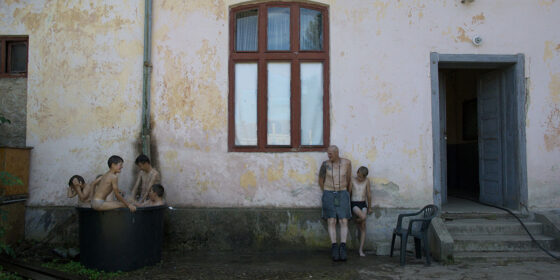TIFF 2022 | Sparta (Ulrich Seidl, Austria/France/Germany) — Contemporary World Cinema

By Mike Thomas
At time of writing, it’s not clear whether Ulrich Seidl’s Sparta will have its planned world premiere at TIFF, with rumours circulating that the film will be pulled from the programme because of a damning exposé, published in the German weekly Der Spiegel, that accuses the Austrian provocateur of exploiting and psychologically abusing the non-professional child actors who appear in his film. Seidl rejects the allegations in a statement posted on his website and both the Austrian Film Institute, which partly funded the film, and the authorities in Romania, where it was shot, have opened investigations.
Ever since his student film The Prom (1982) caused such a stir at the Vienna Film Academy that he left the university without graduating, controversy has been Seidl’s stock-in-trade. It’s nevertheless unsurprising that Sparta should be particularly explosive, seeing as its subject is paedophilia. Seidl’s signature strategy is to elicit empathy for a contemptible character, which in Sparta entails playing on the strict etymology of the word “paedophile:” someone who loves children. In the case of the protagonist Ewald (Georg Friedrich), the love is genuine and even reciprocated, but does not extend to sexual contact.
Ewald is the brother of Richie Bravo, the central character in Rimini. Sparta elaborates on the father thematic of its predecessor—the two films were originally conceived as one and Seidl decided to split them during the edit—by following Ewald as he moves to an impoverished Romanian village and takes over an abandoned school, where he sets up a dojo called Sparta, offering free judo classes for the local children. The chief premise is that the boys who enthusiastically spend their days at Sparta come from abusive homes and that a potential molester provides the nurturing care denied them by their violent, alcoholic fathers.
Although no molestation takes place, numerous scenes of children in their underwear push at the limits of what can be considered appropriate with the intention of making the viewer squirm. Since Seidl is a gifted filmmaker and Friedrich an exceptional actor, they succeed in rendering Ewald a classical tragic hero, thus creating an intense dialectical viewing experience. Undercutting this achievement is the nagging impression of being conned. Of course, this is true of much of Seidl’s work, but he typically deals in more original and thought-provoking propositions. The question of whether a paedophile who doesn’t act on their urges is deserving of compassion is a trope, found in films as varied as Lars von Trier’s sniggering Nymphomaniac: Vol. II (2013) and Nicole Kassel’s bleeding-heart The Woodsman (2004). It’s even the subject of another film premiering at TIFF this year: Carlos Vermut’s Manticore. Whenever it’s employed, it feels like the filmmakers are setting themselves a speculative challenge vis-à-vis the viewer rather than truly probing the darker complexities of the human condition.
Here the sympathy-for-the-devil conceit distracts from an otherwise compelling exploration of themes that stretches across Sparta and Rimini. Gesturing towards the Austrian legacy of WWII through the character of Ewald and Richie’s potentially Nazi father, Seidl presents the two brothers, whose narratives are underpinned by critiques of masculinity and neo-colonialism, as differing personifications of a stunted national psyche. The grim irony of the allegations raised by Der Spiegel is that Sparta has now gained a meta dimension that casts Ewald as the director’s alter ego: a man who travels to Eastern Europe and is attacked for pursuing aims that he deems virtuous through questionable methods. It’s doubtful that Seidl intended this less than flattering analogy but he should be glad if the investigations extend it further and reveal him to also have been targeted by a prejudiced and misguided mob.
Mike Thomas

